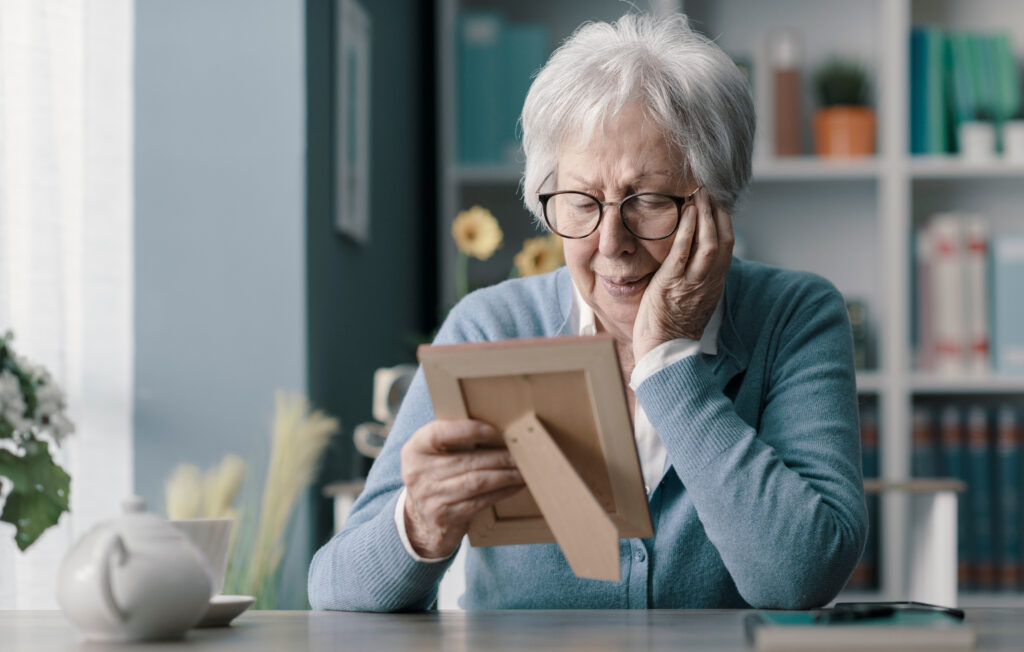What to Say to a New Widow
 Our society is not great dealing with grief. Although we have our religious traditions, people are very uncomfortable when giving condolences to the bereaved.
Our society is not great dealing with grief. Although we have our religious traditions, people are very uncomfortable when giving condolences to the bereaved.
Condolences frequently come through sympathy cards. There are three types of cards: first, the sentimental card expressing “sincere condolences at this difficult time”—all printed and the sender only needs to sign. Second, a similar expression of “deep sympathy for your loss” on a printed card with a short added personal note from the sender. The note might be: “thinking of you,” “keeping you and your family in our prayers,” or slightly longer: “I can remember when we last saw you and your husband, we had such a lovely time. We shall deeply miss him.” And finally the third, a handwritten note perhaps with a remembrance of the sender’s personal memories or thoughts about deceased or solely words of sorrow and caring.
All of the above are very kind gestures. They simply say “I know, I care, and I want to tell you that.” My thought is do not worry about what card you choose. The card itself says “I care enough to get a card, find a stamp, find your address, and get myself to the post office to mail it to you.” Remember that.
Now what I didn’t say above is that cards also have personally written phrases such as: “I know this time is difficult for you, when you are ready, let me know so we can get together.” Or “I’d love to see you but know that you need some time with just family. Call me when you want to meet.”
NO! NO! NO! these comments mean well but, they are not helpful. The grieving process is long and difficult and different for everyone BUT when our loved one has just died, we do not have the energy or the coherent thought process to reach out and set up social dates. Remember that.
Do not ask the grieving widow for anything. Make concrete suggestions with definite dates so that she can chose. And one of her choices can legitimately be to not answer your thoughtful note. Your feelings need not be hurt. These times are only about the grieving widow. There is no place for your ego in these circumstances.
If you want to see the widow, then write something along these lines: “I’d love to see you—coffee? Lunch? A walk? A drink? A visit? Whatever… Would anytime Monday or Thursday be good? If not, I welcome other ideas, or you don’t even have to answer. Know that I am thinking of you and care a great deal. Sending lots of love…”
Further, let the widow tell you how she is feeling, please do not tell her that you know this holiday or that event is difficult or will be hard. Maybe for her it will be but… maybe not. ASK but do not presume. The reason I advocate asking is that it takes energy to correct an emotional presumption. As I mentioned earlier, energy is what a widow lacks.
Also, a minor point: do provide contact information. I received a few extremely kind notes from people I hadn’t seen in a long time. Although they both offered that I let them know when I am ready—not the best but well meant, they gave me zero contact info. No return address on the envelope, no address in the card, no phone number and no email address. When I was ready, I would have enjoyed meeting but…Thanks anyway!
Be available and present for the widow and expect nothing in return. Check in by phone or email or mail sending love or just letting her know you are thinking of her. AND, do not be afraid or consumed with the “I don’t know what to says…” It is not about you. Just be honest and listen.
You might say “I really don’t know where you are or what you are thinking/feeling these days.” If you want, you can surmise by using words: “I imagine,” or “knowing you you might…” IF you are a widow and wish to share an experience you had as a new widow, go ahead. Then maybe add “because everyone processes grief differently what I have said above might be pure projection and not helpful or relevant to you at all. If so, my apologies. Just know that I care.”
It is all fine. Just don’t avoid the widow or be concerned that you will say the wrong thing. It’s a new role for her and she needs her friends and family to help her find her way. Widowhood is not contagious. It is a role that requires a lot of change and adjustment. We best do that with friends who support, accept us and listen to us.
Amen to everything you wrote. It is the fog, the “now what?”, the “I can’t believe this has happened” (happened to my beloved spouse, happened to me), the perceived dark future, the nothingness ahead. The best support, to my mind, is to just walk along side, listen, let the widow talk endlessly about her spouse and loss…however long it takes.
Marilyn, I am well aware that unfortunately you know all too well about the early stages of widowhood. Thank you for choosing to share more about the emotional confusion, pain and needs. Beautifully done.